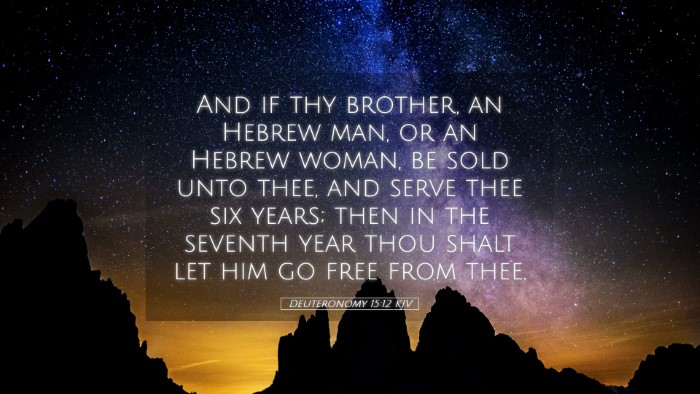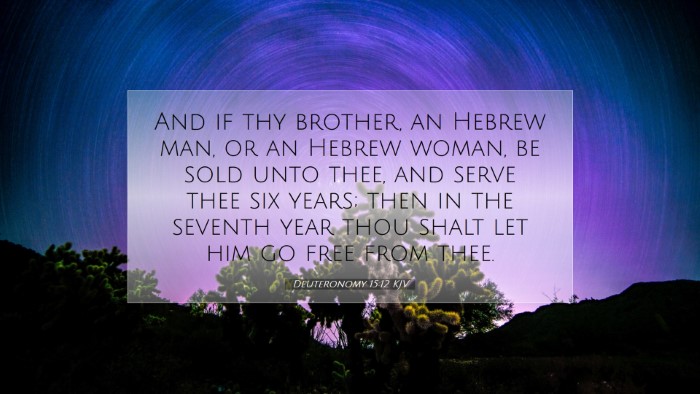Commentary on Deuteronomy 15:12
Verse: "If your brother, a Hebrew man or a Hebrew woman, is sold to you, he shall serve you six years; and in the seventh year you shall let him go free from you."
Introduction
Deuteronomy 15:12 addresses an important aspect of Hebrew law concerning servitude and economic justice among the Israelites. This verse is situated within a larger context of laws that govern social and economic relationships, emphasizing themes of compassion, freedom, and the equitable treatment of one’s fellow Israelite. Throughout history, this verse has drawn significant theological reflection, shedding light on God’s intent for His people concerning servitude and familial relationships.
Historical Context
Matthew Henry notes that in ancient Israel, servitude was a common institution. Hebrew laws structured these relationships to ensure they were just and humane. The passage lays out a fundamental rule that a Hebrew servant cannot be held in servitude indefinitely, thus promoting the idea of liberation and restoration every seven years. This aligns with the concept of the Year of Jubilee, which emphasizes rest, restoration, and economic equity.
Albert Barnes further expands on this, noting that the arrangements for servitude were meant to prevent the oppression of fellow Israelites. The practice allowed individuals to sell their services due to economic hardship while ensuring that they were not treated as permanent slaves but rather as temporary workers who were to be released in due time.
Theological Implications
Freedom and Redemption: The release of the servant in the seventh year symbolizes a profound theological truth about freedom and redemption. Just as a servant is released, so are all believers offered spiritual freedom through Christ. This intended release serves as a foreshadowing of the ultimate redemption found in the New Testament. Adam Clarke comments that the act of freeing a servant reflects God’s desire for His people to imitate His grace and mercy.
Social Justice: This verse also emphasizes social justice. In view of this law, the community's health hinges on the care and welfare of all its members, including the vulnerable. A failure to observe this law could lead to a society marked by inequality and oppression. Matthew Henry brings attention to this aspect, suggesting that failure to uphold such divine mandates leads to negative spiritual consequences.
Practical Applications
For modern-day pastors, theologians, and Bible scholars, Deuteronomy 15:12 encourages active consideration of how contemporary society treats the marginalized, including economic refugees and laborers.
- Compassionate Engagement: This passage challenges believers to engage with compassion and to provide pathways for liberation for those caught in economic bondage.
- Educational Programs: Churches and congregations are called to create educative initiatives that empower individuals economically and socially in their communities, reflecting the heart of this decree.
- Advocacy: The role of advocacy for just economic policies can also be derived from this scripture, driving theological leaders to speak out against injustices that echo the plight of the ancient Hebrew servants.
Conclusion
Deuteronomy 15:12 serves not only as a legal obligation but also as a profound theological statement about God’s character, which calls His people towards just practices rooted in love and compassion. Reflecting on this text leads us towards a greater understanding of how to live out the gospel call today, emphasizing the importance of community, mercy, and renewal.


